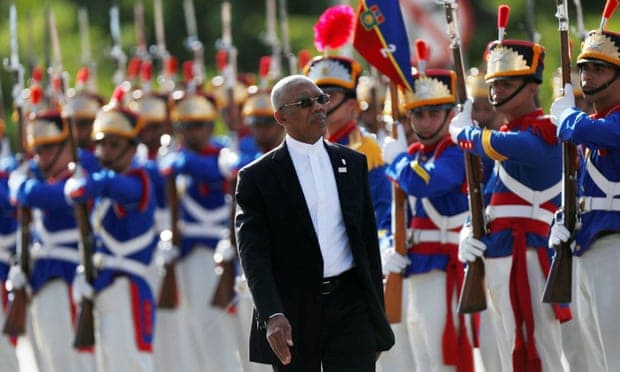Former British colony locked in legal and political impasse over election result
The UK is under pressure to join the US in imposing sanctions on the president of Guyana, who has refused to stand after a disputed election in March.
The former British colony, which borders Venezuela, has been locked in a legal and political impasse since an election recount found the president, David Granger, had lost by 15,416 votes.
The discovery of oil off the country’s coast is destined to transform its economic fortunes, raising the political stakes even higher.
After the recount, the chief executive of Guyana’s electoral commission, Keith Lowenfield, disqualified 120,000 votes, nearly a fifth of those cast, handing the contested victory to Granger.
Last week, the Caribbean court of justice, Guyana’s final appellate court, overruled Lowenfield. But now another legal challenge has been declared in an attempt to prevent the commission from declaring Granger’s defeat.
On Tuesday, the US secretary of state, Mike Pompeo, said it was time for Granger to step aside, announcing travel bans “against those undermining democracy in the country, or complicit in doing so”. He said the country was on “a non-democratic trajectory”.
Pompeo’s move has been endorsed by the US Senate foreign relations committee. Canada also said it would use all the tools at its disposal to demand a swift and transparent conclusion to the election process.
Two UK Foreign Office ministers, Tariq Ahmad and Liz Sugg, have made successive calls for Granger to accept the result.
The Foreign Office has been taking a gradual approach, hoping for reconciliation between Granger’s political coalition, the APNU+AFC, and the rival PPP/C, believing the president would eventually stand down if he ran out of viable options in his attempt to hold on to power.
Aspects of Guyanese politics are divided on ethnic lines, making the transition more fraught.
In December, ExxonMobil began producing crude off the country’s shore. Oil is expected to transform the economy of the poor country, which has a population of 800,000, and there are fears the discovery could prompt Granger to use the military to stay in power.
The country’s two main ethnic groups have grown suspicious that the other is seeking control of oil revenues.
Ralph Gonsalves, the prime minister of St Vincent and the Grenadines and chair of the regional Caricom political grouping, said: “A rogue clique within Guyana cannot be allowed to disrespect or disregard, with impunity, the clear, unambiguous ruling of the CCJ. The time for decisive action is shortly upon us”.
The Organisation of American States has also issued a statement accusing Lowenfield of acting in bad faith.
“The only democratic solution for Guyana at this time is respect for the results of the national recount,” the OAS said. “No other figures – neither those prepared prior to the recount, nor those recently invalidated by the Caribbean court of justice, nor any others that may be unilaterally devised by the chief elections officer – can have any place in the final determination of results. A new electoral process is also an unacceptable solution.”
In a sign of the tensions a fire suspected as arson gutted the Guyana election headquarters on Tuesday night.
Jan Mangal, a former adviser to the president, said it was vital the international community did not just issue a slap on the wrist or else ballot rigging would become entrenched.
He said he was concerned the Granger government was pressing ahead and signing rushed and unscrutinised infrastructure contracts.

